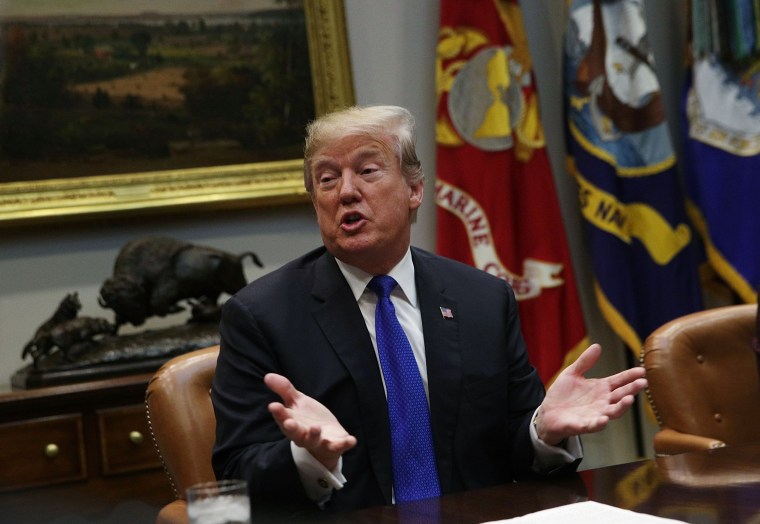Donald Trump and his team have come up with some highly memorable words and phrases that will no doubt be book titles in the coming years: It didn't take long for gems like "Unpresidented," "Alternative Facts," and "American Carnage" to take root in the lexicon, and for good reason.
They'll soon be joined by "very stable genius."
Last week, after Donald Trump effectively dared North Korea to demonstrate its nuclear capabilities, a reporter asked White House Press Secretary Sarah Huckabee Sanders whether Americans should be "concerned about the president's mental fitness." She initially responded by trying to change the subject.
Trump thought it'd be a good idea to address the issue himself via Twitter on Saturday morning.
"Actually, throughout my life, my two greatest assets have been mental stability and being, like, really smart. Crooked Hillary Clinton also played these cards very hard and, as everyone knows, went down in flames. I went from VERY successful businessman, to top T.V. Star to President of the United States (on my first try). I think that would qualify as not smart, but genius....and a very stable genius at that!"
Nothing reassures the public about the erratic president's mental state like reading his impulsive, poorly written tweets, published early on a Saturday morning, about how impressed he is with his stability and intellect.
A few hours later, a reporter asked the president why he felt the need to publish tweets about his mental state. Trump replied, "Well, only because I went to the best colleges for college. I went to a -- I had a situation where I was a very excellent student. Came out and made billions and billions of dollars. Became one of the top businesspeople. Went to television and, for 10 years, was a tremendous success, as you probably have heard. Ran for president one time and won."
Perhaps he didn't understand the question.
Aside from the obvious oddity of the circumstances -- genuinely brilliant people don't make self-defeating boasts about being "very stable geniuses" -- it's worth remembering that Trump has long been desperate to convince people of his dubious intelligence.
During his campaign, for example, Trump assured voters in July 2015, "I'm, like, a really smart person" -- a line he repeated over and over again.
One my personal favorites came during an MSNBC appearance, when Trump was asked about his foreign policy advisers. "I'm speaking with myself, number one, because I have a very good brain," the Republican said. "And I've said a lot of things."
Making matters slightly worse, Trump has begun to compare himself to Ronald Reagan, suggesting that because the Republican icon also faced questions about his mental state, Trump is in good company.
What Trump may not appreciate is the fact that this comparison doesn't work on his favor. As the Washington Post reported, "The news media did indeed question Reagan's mental health at times, but such questions were at least somewhat validated by the 40th president's Alzheimer's diagnosis in 1994 and his son's 2011 claim that Reagan displayed symptoms of the disease while in office. If Trump's aim is to dismiss concerns raised by Michael Wolff's 'Fire and Fury' as completely unfounded, then Reagan is not the best historical reference."
At his press conference on Saturday, the president added, "[T]his is a country that I don't want looking foolish. And it's not going to look foolish as long as I'm here."
Self-awareness has never been one of Trump's strengths.
Postscript: It's hardly the most important detail, but take a moment to appreciate the fact that he literally wrote "like" into his tweet on the subject. "Like" is a word people routinely say aloud as a mental placeholder, but seeing a president tweet it, while describing his intellect, added an unintentionally amusing twist.
